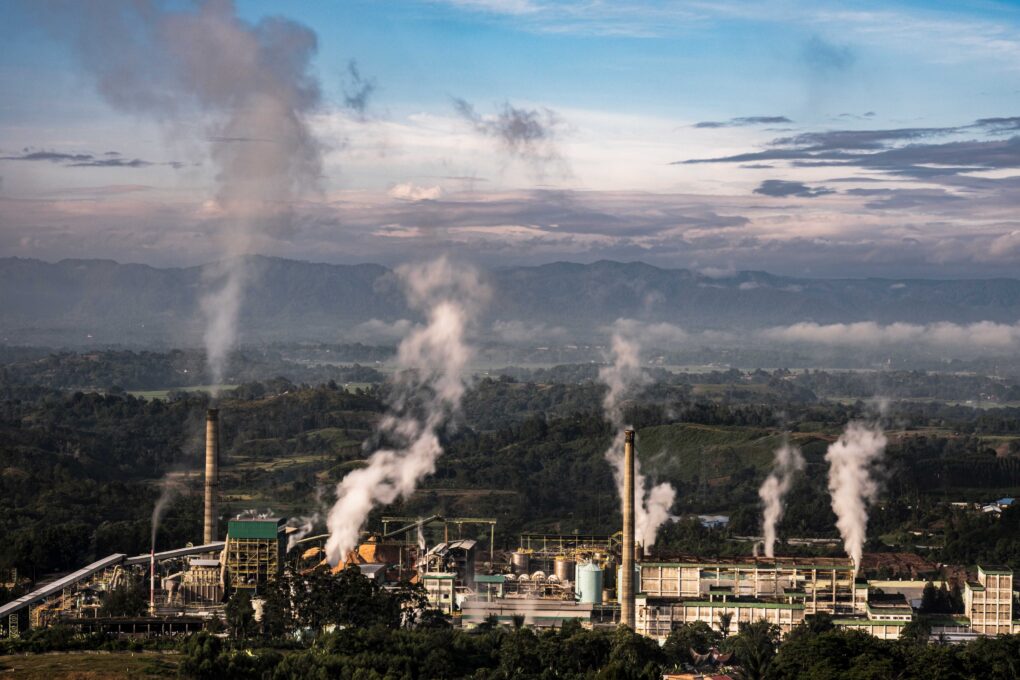Key Findings
- PT. Toba Pulp Lestari reaffirms its commitment to halting forest conversion, which, if implemented, would make the customary forests of Indigenous communities off-limits to plantation development.
- Time-bound completion and credible outcome of the village boundary and land rights mapping underway will be particularly critical to remedying the rights violations raised by members of the Pargamanan-Bintang Maria community.
- PT. Toba Pulp Lestari’s commitment is being scrutinized due to recent reports of intimidation and violence in its operations in North Sumatra, Indonesia.
- Major brands Procter & Gamble, Kao, PepsiCo, Unilever, Nestlé, and Nissin Foods, and bank Mitsubishi UFJ Financial Group continue to be connected through their business with Royal Golden Eagle Group. They must ensure rights are respected at a corporate group level.
In December 2024, PT. Toba Pulp Lestari (PT. TPL), part of the notorious Royal Golden Eagle (RGE) Group, reaffirmed a commitment to halt forest conversion for industrial pulp plantations and stop the establishment of new plantations that contribute to deforestation, human rights abuses, or disregard for Indigenous Peoples rights to say no to development on their territories. If implemented, the commitment would make customary forests of Indigenous Batak communities like Pargamanan-Bintang Maria that are subject to a long-standing conflict off-limits to plantation development.
Since November 2021, RAN elevated the fight of members of the Pargamanan-Bintang Maria community who have been advocating to keep their ancestral forests standing from the threat of plantation development by PT. Toba Pulp Lestari. Over 700 hectares of the community’s land overlap with one of the company’s concessions, which are located in North Sumatra, Indonesia. Nearly 30 percent of their customary lands have been developed into industrial pulp plantations despite outstanding opposition from a subgroup of community members. Some community members also faced intimidation when voicing their opposition, adding to PT. TPL’s long track record of alleged intimidation and criminalization against local communities.
Implementation of Rights Pending
The statement issued by PT. TPL is a response to grievances that RAN has raised to PT. TPL’s financiers and major brands that are clients of the RGE Group’s palm oil arms — Apical and Asian Agri. The grievance raised three core issues—the failure of PT. TPL to fulfill international obligations on respecting Indigenous Peoples’ rights, ongoing allegations of intimidation of Human Rights Defenders, and deforestation in PT. TPL’s operations and those of shadow companies under the control of Sukanto Tanoto and his family, who are the ultimate beneficiaries of the RGE Group. Given PT. TPL’s history, the implementation of the commitments in its recent statement will be the true measure of whether the company has meaningfully changed.
The time-bound completion and credible outcome of the village boundary and land rights mapping process referenced in the statement will be particularly critical to remedy the rights violations raised by members of the Pargamanan-Bintang Maria community. Community members who say no to PT. TPL’s development must have their rights respected and be supported in how they choose to manage their land and customary forests, including through social forestry schemes beyond company partnership (Kelompok Tani Hutan) programs. In the case of Pargamanan-Bintang Maria, this would mean supporting their petition for legal recognition of their customary forests or Hutan Adat.

On the issue of demonstrating protections for human rights defenders from intimidation, violence, and criminalization, the statement only links to PT. TPL’s policy that states, “Zero tolerance for the use of force act of intimidation, or bribery”. Unfortunately, these words mean little as local groups continue to report recent cases of intimidation, physical violence, and criminalization against impacted Indigenous communities like Nagasaribu and Dolok Parmonangan.
In February 2025, following recent reports of intimidation and violence towards members of the Nagasaribu community, PT. TPL issued a further statement reiterating its commitment not to undertake operations on contested lands. The company stated that it acknowledged and deeply regretted the unfortunate incident in January 2025 involving members of the Nagasaribu community and its operational teams. PT. TPL committed to stopping operational activities in Nagasaribu, reviewing the actions of its security team, and supporting demarcation efforts that will confirm the boundaries of the customary lands that the Indonesian government has recognized. The tone of this statement was in contrast to one issued weeks earlier that denied any wrongdoings, cast blame on civil society organizations and community members for the violent altercation that occurred with PT. TPL’s security personnel, and referred to the matter as being under police investigation.
TPL also issued a statement on the recent incident with members of the Dolok Parmonangan. In this statement, the company did not commit to halting operations in this area or condemn the actions of its security teams, which responded to the situation in a manner that caused physical harm to community members.
The importance of resolving land conflicts was also recently affirmed in a Medan High Court ruling 1 in October 2024 that acquitted Sorbatua Siallagan, an Indigenous leader from Dolok Parmonangan who was criminalized for farming on contested lands overlapping PT. TPL’s concession, from all criminal charges and recommended prioritizationing land conflict resolution. The court was not able to determine criminal offense because the ownership rights over the land are in dispute and referred to a Ministry of Environment and Forestry Decree 2 issued in 2021 to resolve customary forest issues. In deliberating the case, the panel of judges also considered the protected rights of Indigenous Peoples over their land and customary forests under Indonesian Law and Constitution. Despite this win, Sorbatua Siallagan’s case is currently being processed at the Indonesian Supreme Court after the public prosecutor from the Simalungun District Attorney’s Office filed a cassation appeal to the Supreme Court.
As a concrete next step, RAN is calling on PT. TPL to demonstrate the implementation of its commitment where it matters — with impacted rights holders on the frontlines of its operations in North Sumatra, Indonesia, and to adopt a dedicated policy that commits the company to zero tolerance for intimidation, criminalization, and violence of affected communities and Human Rights Defenders. Stakeholders need to see an immediate end to all forms of intimidation, coercion, and violence against all Indigenous communities before they can trust the company’s claims of sustainable practices.
The Market Connections
PT. TPL is owned and controlled by the Tanoto family of the Royal Golden Eagle group through a complex series of offshore companies (outlined p. 63-71). RGE is a multi-billion dollar conglomerate that is Indonesia’s second-largest pulp and paper producer and a major producer and trader of palm oil.

RGE supplies palm oil to major brands, including Procter & Gamble, Kao, PepsiCo, Unilever, Nestlé, and Nissin Foods. The RGE group also continues to profit from its joint venture operations with Kao.
Brands must ensure that the corporations they do business with are not violating the rights of Indigenous People or criminalizing, intimidating, or trying to silence Indigenous communities and Human Rights Defenders. RAN calls on brands to take immediate, concrete actions to ensure protection for Indigenous communities fighting to protect their lands from corporate exploitation.
Major banks providing finance to RGE Group have also failed to apply their sustainability policies at a corporate group level. Japanese megabank Mitsubishi UFJ Financial Group (MUFG) has a No Deforestation, No Peatland, No Exploitation (NDPE) aligned policy for palm oil and pulp and paper producer clients. However, MUFG’s social and environmental policies do not explicitly apply to their clients’ entire corporate group. This provides the bank with a loophole, allowing MUFG to claim it is not connected to the destructive impacts of a client’s wider group of companies, such as PT. TPL and other RGE shadow company operations. A consequence of this loophole is that MUFG has helped RGE raise billions in controversial Sustainability Linked Loans (SLLs) by acting as an advisor and lead arranger. RAN calls on all actors that finance, do business with, or source from the RGE Group to immediately suspend business relations with the RGE Group.
- Medan High Court Ruling (Putusan Pengadilan Tinggi Medan) No. 1820/PID.SUS-LH/2024/PT MDN on October 17, 2024
- Indonesian Ministry of Environment and Forestry Decree No. SK.352/MENLHK/SETJEN/KUM.1/6/2021 on Steps to Resolve the Issue of Customary Forests and Industrial Waste Pollution in the Lake Toba environment (Surat Keputusan Menteri Lingkungan Hidup dan Kehutanan RI Nomor SK.352/MENLHK/SETJEN/KUM.1/6/2021 Tentang Langkah-Langkah Penyelesaian Permasalahan Hutan Adat dan Pencemaran Limbah Industri di Lingkungan Danau Toba)













